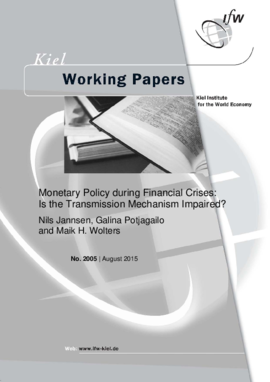Arbeitspapier
Monetary Policy during Financial Crises: Is the Transmission Mechanism Impaired?
Autoren
Erscheinungsdatum
JEL Classification
Schlagworte
Geldpolitik
Wirtschafts- & Finanzkrisen
Konjunktur Welt
Konjunktur
We study the macroeconomic effects of monetary policy during financial crises using a Bayesian panel vector autoregressive (PVAR) model for 20 advanced economies. We interact all of the endogenous variables with financial crisis dummies, which are constructed using the narrative approach. We also distinguish between an acute initial phase of financial crises and a subsequent recovery phase. We show that an expansionary monetary policy shock has large positive effects on output and inflation during the acute phase of a financial crisis. These effects are larger than those during non-crisis periods. Decreased uncertainty as well as increases in consumer confidence and share prices explain these large effects, whereas these variables are much less relevant for monetary policy transmission outside financial crises. Counterfactual analysis shows that the transmission mechanism would be impaired without the effects of monetary policy on these variables, where credit would not react at all and the response of output would be substantially lower. During the recovery phase of a financial crisis, output and inflation are generally non-responsive to monetary policy shocks.







